Europe
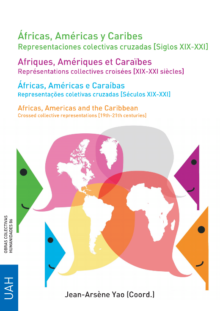
As (im) pertinências do método. Metodologia participativa e o estudo sobre a Afrodescendência em Portugal
Abstract:
The announcement of the Decade of African Descendants (2015-2024) by the UN, drew attention to the presence of African descendants in Europe, including in Portugal, as part of the contemporary social configuration of the continent. However, the focus on these people has been sustained, above all, in theories and representations of subalternity and exclusion that do not recognize them as new political subjects in a Europe that is no longer black and white. These politically hybrid subjects, in the historical and cultural sense, bring theoretical-epistemological and methodological challenges to the social sciences, since their visions, paradigms and ways of living escape the traditional lenses of the approaches that associate them with immigrants or refugees. We propose that in approaching the subject of Afrodescendence, method is central and determinant of the outcomes, ethical function and meaning of social research on emerging contemporary subjects. We argue in favour of participatory methodology, reflecting on its pertinence in a context where the people in the researched situation are critical subjects in their fields of intervention/action who reject being reduced to mere objects of study. We analyse the processes of negotiation in the field concluding on the contribution of this project to the dialogue between academics and the afrodescendant collectives. As (im)pertinências do método. Metodologia participativa e o estudo sobre a Afrodescendência em Portugal is inserted in the debate on the democratization of knowledge, sustained, in particular, by critical perspectives that are based on studies on emerging contemporary subjects.
Quotation:
Évora, Iolanda. “As (im)pertinências do método. Metodologia participativa e o estudo sobre a Afrodescendência em Portugal”, In: Yao, Jean-Arséne, Victorien Lavou Zoungbo et Luis Mancha San Esteban, eds. Forthcoming. Representations collectives croisées: Afriques, Amériques et Caraibes. Xix-xxi siècles. III GRELAT. Actas do Colóquio. Madrid: UAH Editora, 167-176. ISBN:978-84-18254-12-3.
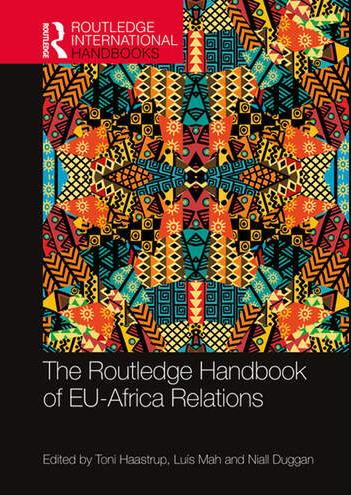
The Routledge Handbook of EU-Africa Relations
Abstract:
This handbook provides a comprehensive overview of the changing dynamics in the relationship between the African continent and the EU, provided by leading experts in the field. Structured into five parts, the book provides an incisive look at the past, present and potential futures of EU-Africa relations. The cutting-edge chapters cover themes like multilateralism, development assistance, institutions, gender equality and science and technology, among others. Thoroughly researched, this book provides original reflections from a diversity of conceptual and theoretical perspectives, from experts in Africa, Europe and beyond. The handbook thus offers rich and comprehensive analyses of contemporary global politics as manifested in Africa and Europe. This handbook will be an essential reference for scholars, students, researchers, policy makers and practitioners interested and working in a range of fields within the (sub)disciplines of African and EU studies, European politics and international studies. The Routledge Handbook of EU-Africa Relations, by Luís Mah (researcher for the Centre for African and Development Studies), Nial Duggan and Toni Haastrup is part of the mini-series Europe in the World Handbooks examining EU-regional relations and established by Professor Wei Shen.
Quotation:
Mah, Luís, Duggan, Nial & Haastrup, Toni (2021). The Routledge Handbook of EU-Africa Relations. Routledge. ISBN 9781315170916.
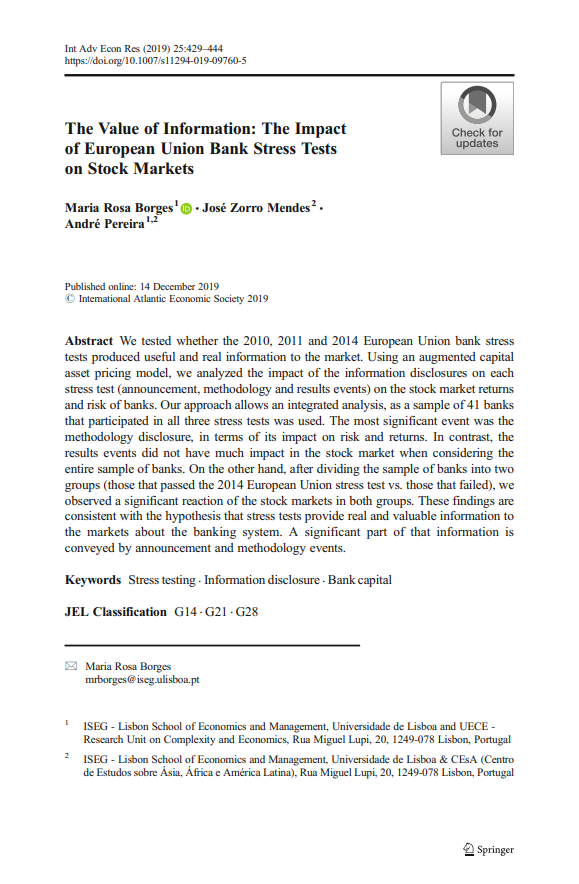
The Value of Information: The Impact of European Union Bank Stress Tests on Stock Markets
Abstract:
In The Value of Information: The Impact of European Union Banks Stress Tests on Stock Markets we tested whether the 2010, 2011 and 2014 European Union bank stress tests produced useful and real information to the market. Using an augmented capital asset pricing model, we analyzed the impact of the information disclosures on each stress test (announcement, methodology and results events) on the stock market returns and risk of banks. Our approach allows an integrated analysis, as a sample of 41 banks that participated in all three stress tests was used. The most significant event was the methodology disclosure, in terms of its impact on risk and returns. In contrast, the results events did not have much impact in the stock market when considering the entire sample of banks. On the other hand, after dividing the sample of banks into two groups (those that passed the 2014 European Union stress test vs. those that failed), we observed a significant reaction of the stock markets in both groups. These findings are consistent with the hypothesis that stress tests provide real and valuable information to the markets about the banking system. A significant part of that information is conveyed by announcement and methodology events
Quotation:
“Borges, M. R., Mendes, J. Z. and Pereira, A. (2019). “The Value of Information: The Impact of European Union Banks Stress Tests on Stock Markets”. International Advances in Economic Research, 25, 429-444. https://doi.org/10.1007/s11294-019-09760-5“
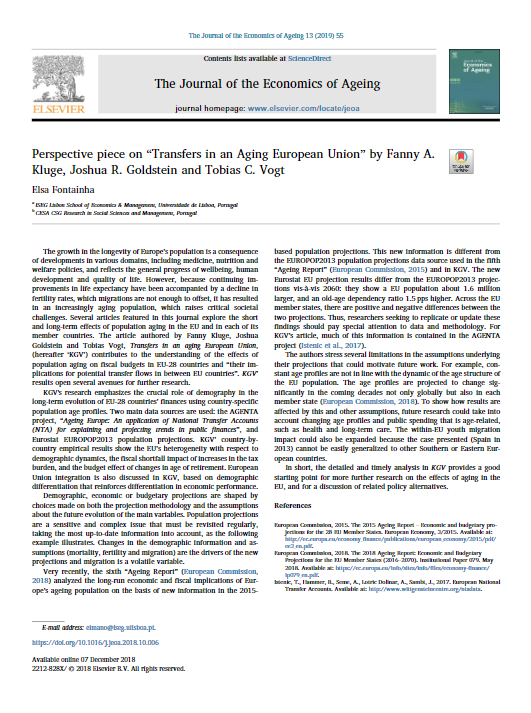
Perspective piece on “Transfers in an Aging European Union” by Fanny A. Kluge, Joshua R. Goldstein and Tobias C. Vogt
Abstract:
The growth in the longevity of Europe’s population is a consequence of developments in various fields, including medicine, nutrition and welfare policies, and reflects overall progress in well-being, human development and quality of life. However, as the continued improvement in life expectancy has been accompanied by a decline in fertility rates, which migration is not sufficient to compensate for, it has resulted in a growing ageing population, which raises critical societal challenges. Several articles presented in this journal explore the short and long-term effects of population ageing in the EU and in each of its member countries. The article written by Fanny Kluge, Joshua Goldstein and Tobias Vogt, Transfers in an ageing European Union, (hereafter “KGV”) contributes to understanding the effects of population ageing on the fiscal budgets of EU-28 countries and “its implications for potential transfer flows between EU countries”. The results of “KGV” open several avenues for further research. Elsa Fontainha comments on the work of Fanny A. Kluge, Joshua R. Goldstein and Tobias C. Vogt on population transfers in the European Union.
Quotation:
Fontainha, E. (2019). Perspective piece on “Transfers in an Ageing European Union” by Fanny A. Kluge, Joshua R. Goldstein and Tobias C. Vogt. Journal of the Economics of Ageing, 13, 55-55. https://doi.org/10.1016/j.jeoa.2018.10.006
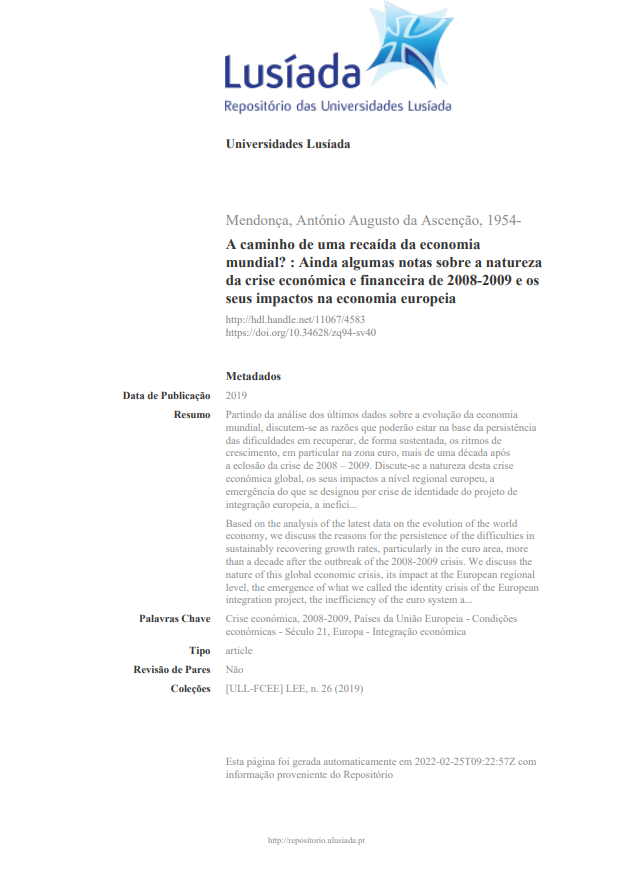
A Caminho de uma Recaída da Economia Mundial? Ainda Algumas Notas sobre a Natureza da Crise Económica e Financeira de 2008-2009 e os seus Impactos na Economia Europeia
Abstract:
Based on the analysis of the latest data on the evolution of the world economy, the reasons that may underlie the persistence of the difficulties in recovering, in a sustained manner, the rates of growth, particularly in the euro zone, more than a decade after the outbreak of the crisis of 2008-2009, are discussed. The nature of this global economic crisis is discussed in A caminho de uma recaída da economia mundial? : Ainda algumas notas sobre a natureza mundial? : Ainda algumas notas sobre a natureza da crise económica e financeira de 2008-2009 e os seus impactos na economia europeia, its impacts at the European regional level, the emergence of what has been called an identity crisis of the European integration project, the inefficiency of the euro system as an adjustment mechanism, internal and external, and the role of unconventional monetary policy. The conclusion is that Europe needs to undertake a profound redefinition of its integration project, including the redesign of the euro system in light of the recent experience of unconventional monetary policy. In this process, it is considered that there is an important place for Portugal, as an Atlantic European country, whose identity was formed and consolidated in the process of constitution of the global economy.
Quotation:
Mendonça, António .2019. A caminho de uma recaída da economia mundial?: Ainda algumas notas sobre a natureza mundial?: Ainda algumas notas sobre a natureza da crise económica e financeira de 2008-2009 e os seus impactos na economia europeia”, Lusíada – Economia & Empresa, nº 26, p. 31-66
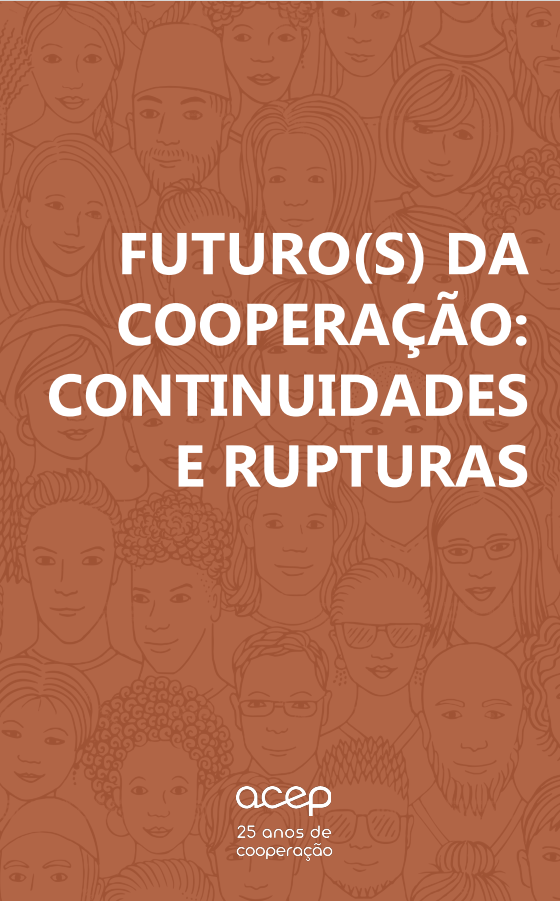
Futuro(s) da Cooperação: Continuidades e rupturas
Abstract:
At a time when a new strategy for Portuguese Cooperation is being defined and profound changes are taking place at the global level, ACEP and CEsA have decided to mark their years of experience in the sector with a document that is intended as a contribution towards evaluating the path of Portuguese Cooperation policy and setting the course for possible futures. In Futuro(s) da Cooperação: Continuidades e Rupturas, in addition to our vision and questions about the policies of Portuguese and European cooperation and the role of civil society, we have also included other voices of partners and specialists, particularly from Africa, which run through the whole document and give it a more plural, multidisciplinary and multi-geographic character. This document was prepared by the ACEP team, within the framework of an advocacy and political influence project, developed in partnership with CEsA (CSG/ISEG/ULisboa), with the support of Camões – Instituto da Cooperação e da Língua. Alongside the rescue of principles and values – in speech and in practice – a serious and uncomplicated discussion must be started on power relations and the ‘delocalisation of aid’, laid bare by the pandemic crisis. This debate, already on the agenda in countries like the United Kingdom, is still absent in Portuguese Cooperation. An approach to the localisation of cooperation as a process of autonomisation implies a process logic, without a fixed time, in which non-financial resources are valued, which allows for a subjective space/time for growth and which lasts beyond this or that funding or project.
Quotation:
Oliveira, A. F., Proença, F., Cavaco, R. (2021). Futuro(s) da Cooperação: Continuidades e rupturas. Lisboa: ACEP e CEsA.
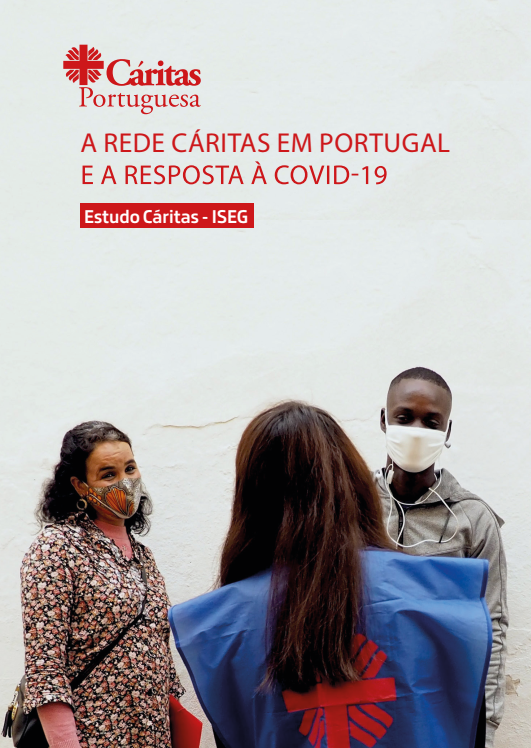
A Rede Cáritas em Portugal e a Resposta à Covid-19
Resumo:
A Rede Cáritas em Portugal e a Resposta à Covid-19 analyzes the importance of the social action of the Cáritas Network in Portugal in an unexpected and health emergency context, by documenting the organization’s response to the Covid-19 pandemic. An analysis is made of the continuity actions, but also of the innovations that emerged during the first year of the pandemic. With a presence that covers all the districts of Mainland Portugal and Islands, the Cáritas Network in Portugal developed, for the first time, a National Program of direct support to families in the form of goods and food stamps, as well as occasional and urgent financial support intended for payment of basic needs such as rent, health and electricity expenses, to a considerable number of beneficiaries (10,444 people, 3,205 families). The study shows that the Cáritas Network in Portugal was able to continue the food support activities and occasional support that it was already developing, given a greater demand from families: 60% of people who sought support from Cáritas in this period had never resorted to this kind of help.
Citação:
Pais Bernardo, Luís, Ana Luísa Silva, Renata Vieira de Assis e Luís Mah (Coord.). 2021. “A Rede Cáritas em Portugal e a Resposta à Covid-19”. Estudo Cáritas / CEsA-ISEG. Lisboa: Cáritas Portuguesa. Agosto.
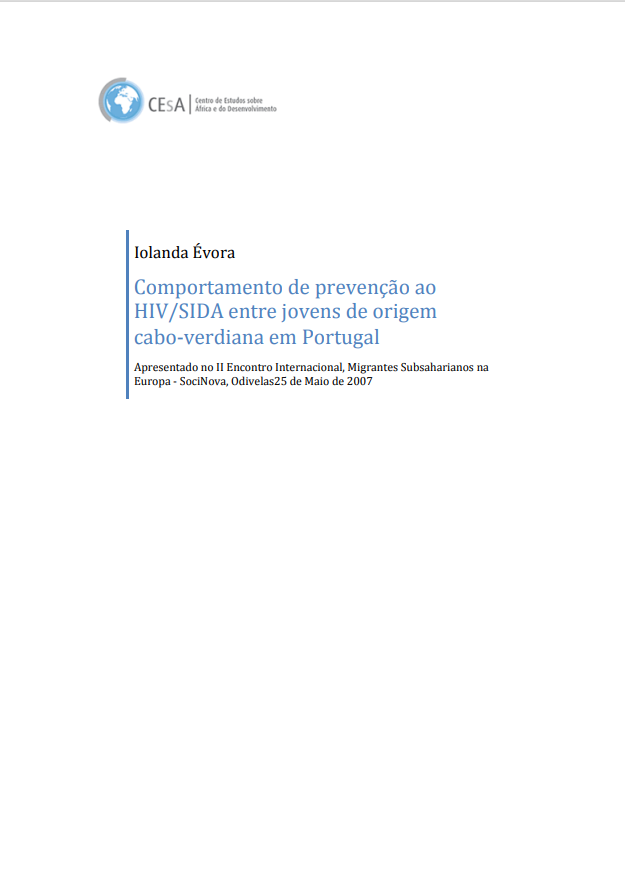
Comportamento de prevenção ao HIV/SIDA entre jovens de origem cabo-verdiana em Portugal
Abstract:
This study that we carried out, and whose partial results are presented here, deals with the prevention behavior of the young Cape Verdean population immigrated to Portugal in relation to HIV/AIDS. The promoters of Comportamento de prevenção ao HIV/SIDA entre jovens de origem cabo-verdiana em Portugal were two Cape Verdean institutions: the Ministry of Foreign Affairs and the Cape Verde AIDS Coordination Committee, sponsored by the World Bank. The aim of this study was to understand the relationship (or gap) between the knowledge that young people have about HIV/AIDS and their day-to-day prevention practices. Likewise, we tried to explore the possible interferences of the immigration factor in the attitudes and theories of young people about HIV/AIDS and the behaviors they consider the safest. The study is, therefore, among those that seek to support health education proposals related to HIV/AIDS, based on the understanding of the way in which different populations or communities conceive health care. The study was carried out with young people of Cape Verdean origin living in Portugal, whether or not they were born in Cape Verde. We cover both sexes equally (8 men and 7 women), aged between 16-26 years and living in social relocation neighborhoods, that is, neighborhoods built by municipal structures to replace slums. The regions covered were those with a large number of Cape Verdeans and their descendants: Lisbon, Greater Lisbon and Loulé. We believe that belonging to such spaces circumscribes the social and economic situation of this group because, although questionable, the definition of rehousing neighborhoods contains a social categorization, to a large extent, attributed by the dominant social classification system to young people of immigrant origin in the country. Therefore, we consider this definition because of its implications in the social experience of these young people and in the material and symbolic conditions of existence, on which daily decisions regarding health care and prevention depend. We chose to use a qualitative methodology for data collection that would allow for an in-depth exploratory study and the identification of certain patterns of behavior and perception. This methodology, developed by Rodrigues (1978, 1999) seemed to us to be more suitable for reaching irrational contents, a name that is often attributed by the social sciences to factors that “exist, but cannot be apprehended by reason” (Rodrigues, 1999, p.4). ). As the author says, it is about trying to achieve “what cannot be measured, but which is worth knowing”, that is, the emotional contents and deeper meanings of young people’s explanations about preventive behaviors in relation to HIV/AIDS. We carried out in-depth individual interviews in order to lead the subjects to produce material capable of revealing the representations, the type of perception, the explanatory resources used and the explanations they produce, based on the positions they occupy within their groups, in particular, the position on immigration and HIV/AIDS. Based on self-reflection (free speech), we identified the themes of interest and concern of each young person interviewed, the sequence of themes and the way in which the young person interconnects aspects of his life and his world. Above all, we sought to recognize the place where subjects place the issue of AIDS among the themes of their lives. With the Intermediate Questions, we proposed in Comportamento de prevenção ao HIV/SIDA entre jovens de origem cabo-verdiana em Portugal to explore the issues about HIV/AIDS that were of interest to the project and that had not been brought up, spontaneously, by the young person in the first part of the free speech. Finally, the Socio-Economic Questionnaire made it possible to reach the living conditions of this group in Portugal and also their family history. Here we include questions about the migration of your family group in its different stages and for each of its members.
Quotation:
Évora, Iolanda. 2011. “Comportamento de prevenção ao HIV/SIDA entre jovens de origem cabo-verdiana em Portugal”. Comunicação apresentada no II Encontro Internacional, Migrantes Subsaharianos na Europa, SociNova, Odivelas.
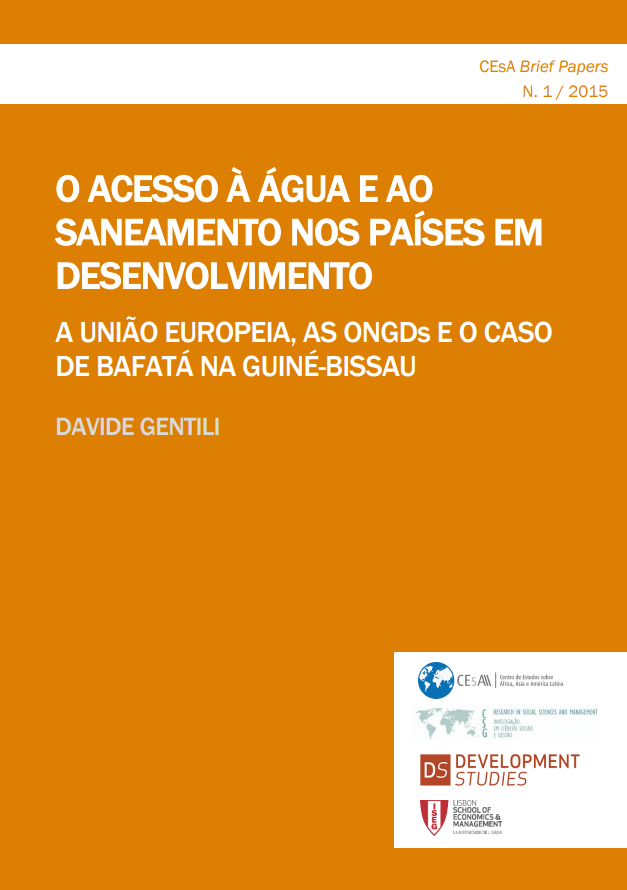
Brief Paper 1/2015: O Acesso à Água e ao Saneamento nos Países em Desenvolvimento: a União Europeia, as ONGDs e o caso de Bafatá na Guiné-Bissau
Abstract:
O acesso à água e ao saneamento nos países em desenvolvimento : a União Europeia, as ONGDs e o caso de Bafatá na Guiné-Bissau is born from the readaptation of the master’s thesis “Access to water and sanitation in developing countries: the European Union, NGDOs and the case of Bafatá in Guinea Bissau” carried out during 2014 and defended in November of the same year. The work is part of the theme of international cooperation with Developing Countries (DP) in the sector of water, sanitation and hygiene (WASH)3 and aims to investigate how good practices, agreed by international donors, for access to water and sanitation, influence the work of NGDOs operating in this sector. Thus, we sought to analyze how the European Union (EU), the most important donor in the WASH sector at an international level, has influenced the work in the WASH sector of the Portuguese NGDO – TESE – Associação para o Desenvolvimento. We tried to observe how TESE interprets the EU guidelines in the WASH sector, trying to understand if there is a blind adaptation to the guidelines in order to capture the funds, or if, on the contrary, there is a vision that guides the actions of TESE independently the availability of funding. In the first decade of the 2000s, the EU has strengthened its commitment to the WASH sector, funding numerous cooperation projects and actively contributing to the international political debate. Among the criteria that led to the choice of TESE, in addition to its geographical proximity and the opportunity to collaborate with the organization’s members, is the fact that it is one of the few NGDOs in Portugal committed to cooperation in the WASH sector in the Portuguese-speaking space. This, over the last decade, has established itself as a reference organization in the panorama of Portuguese NGDOs, being involved in several projects in the water and sanitation sector. Since its birth until today, there has been a substantial evolution of the organization, which now has a stable structure and well-defined objectives. Over time, TESE defined an intervention model specific to the organization. Among the projects carried out, one stands out, Bafatá Misti Iagu (BMI), co-financed by the EU in Bafatá, Guinea Bissau (GB). This will be the object of analysis as a case study. Between February and May 2014, the daily work of the TESE headquarters in Lisbon was monitored. Documents guiding EU cooperation and funding lines in the WASH sector were analyzed and compared with the results of the case study on Bafatá, writing the intervention context of the BMI project. from the analysis of documents of the projects carried out by TESE, from the evaluations of the projects and from the interviews carried out with current and previous members of the NGDO5. The comparison was mainly focused on: (1) the desired objectives, the target groups, the proposed actions and the approach promoted in the actions; (2) the approach to the key issues of access and management of water services. Here, we sought to compare the principles inherent to institutional and management issues (What is the resource management model that is promoted?), social and economic (What is the value attributed to water, in equity, in human rights, in gender equity? , in the quality of services promoted, and in questions of ownership, price, pricing of services?), and finally environmental, information, education, communication and technology6. This analysis resulted in a substantial approximation between the EU guidelines and the projects carried out by TESE. This result becomes more interesting considering that the line of financing with which TESE financed the BMI project in 2009 did not include specific guidelines on the water sector and the definition of objectives, expected results, activities and more in general. approach and is not subject to EC eligibility criteria in the WASH sector. Regarding the desired objectives, target groups, proposed actions and the approach promoted in the actions, there is a high correspondence of vision. TESE’s actions encompass both an infrastructural component (construction and rehabilitation of infrastructure, implementation of pollution prevention and water protection measures), and measures aimed at improving resource management in order to guarantee the durability of the intervention (awareness of the correct use of resources and education for hygiene, strengthening and management of institutions in the water sector). Among the measures shared by the EU and TESE aimed at resource management is the demand management, which, however, was not applied indiscriminately in the projects carried out by TESE, and each time there was a prior identification of the context and the your needs. The affinity of vision between EC and TESE remains constant, albeit with some difference, looking at the key access and management principles applied in the implementation of the BMI project (See Table A). This did not come about through the opening of a line of financing, but through the identification of the needs and opportunities for cooperation in Bafatá, in a perspective of complementarity and integration with other ongoing initiatives. The expected results were not defined to meet the eligibility conditions of the Call for Proposal -CfP-, but to have the best impact from the point of view of economic, human and environmental sustainability. The definition of these results derives from TESE’s own intervention pattern, which may change according to the context and requirements of the financing lines, but which in substance is not changed. Through the analysis of the projects carried out by TESE, it was possible to identify an intervention model of the organization. This model, the common thread between the projects, is an integral part of its cooperation strategy. Taking into account what has been observed, it can be said that TESE has a vision that guides its actions in the WASH sector, not limiting itself to applying ipsis verbis what is required in the EC CfPs. However, as we have seen, there is a good match between the objectives and good practices approved by the EC and the vision and work of TESE. Comparing the objectives, principles and proposed actions, it can be deduced that, taking as an example the application of the demand management principle, there is no implementation of internationally recognized good practices without a prior analysis of the intervention context.
Quotation:
Gentili, Davide (2015). “O acesso à água e ao saneamento nos países em desenvolvimento : a União Europeia, as ONGDs e o caso de Bafatá na Guiné-Bissau”. Instituto Superior de Economia e Gestão – CEsA Brief papers nº 1-2015.
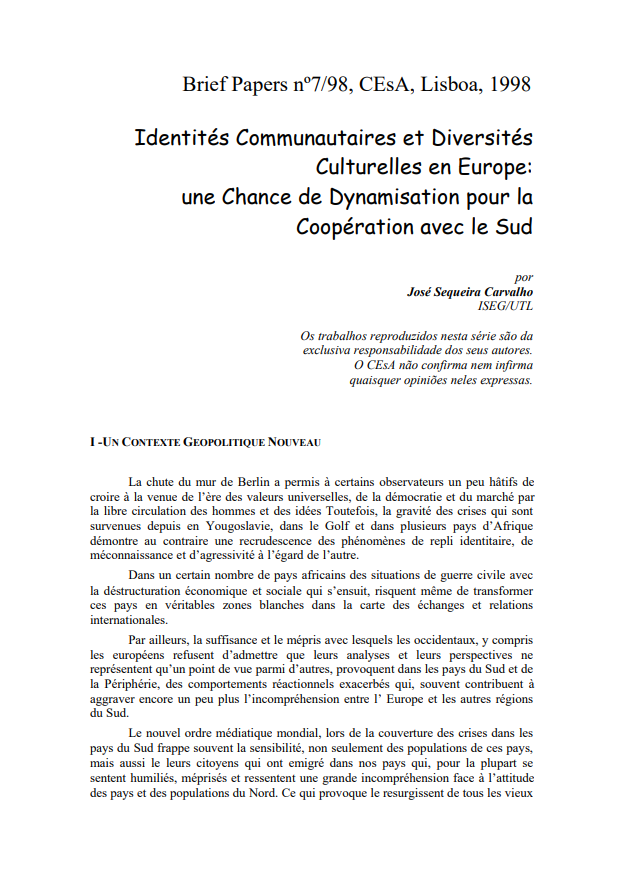
Brief Paper 7/1998: Identités Communautaires et Diversités Culturelles en Europe: Une chance de dynamisation pour la coopération avec le Sud
Abstract:
In Identités Communautaires et Diversités Culturelles en Europe: Une chance de dynamisation pour la coopération avec le Sud we talk about how the fall of the Berlin Wall allowed some rather hasty observers to believe in the arrival of an era of universal values, democracy and market through the free circulation of people and ideas. However, the gravity of the crises that have occurred since then in Yugoslavia, the Gulf and several African countries show, on the contrary, a resurgence of the phenomena of identity withdrawal, misunderstanding and aggression towards the other. In a number of African countries, civil war situations with the resulting economic and social destructuring may even transform these countries into veritable white zones on the map of trade and international relations. Moreover, the presumption and contempt with which Westerners, including Europeans, refuse to admit that their analyses and perspectives represent only one point of view among others, provoke in the countries of the South and of the periphery, exacerbated reactionary behaviours that often contribute to further aggravate the lack of understanding between Europe and other regions of the South. The new world media order, in covering the crises in the countries of the South, often touches the sensibilities not only of the populations of these countries, but also of their citizens who have emigrated to our countries, who, for the most part, feel humiliated, scorned and feel a great lack of understanding of the attitude of the countries and populations of the North. This causes the resurgence of all the old disputes, including psychopathological disputes, between ethnicities, religions and communities of different origins.
Quotation:
Carvalho, José Sequeira. 1998. “Identités communautaires et diversités culturelles en Europe : une chance de dynamisation pour la coopération avec le Sud”. Instituto Superior de Economia e Gestão – CEsA Brief papers nº 7-1998.





